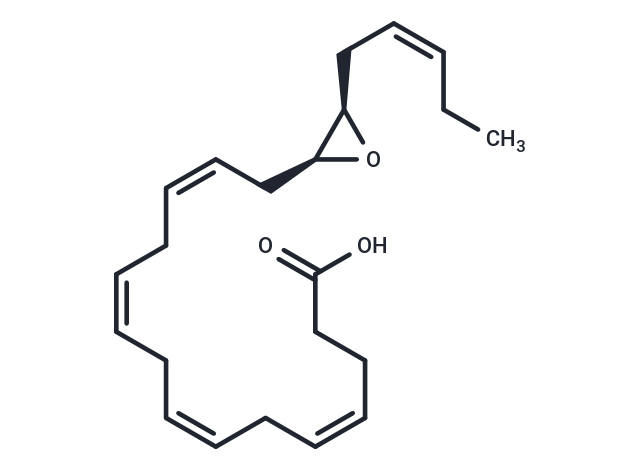 Your shopping cart is currently empty
Your shopping cart is currently empty

EDHF (endothelium-derived hyperpolarizing factor) is an unidentified mediator released from vascular endothelial cells in response to acetylcholine and bradykinin which is distinct from the NOS- (nitric oxide) and COX-derived (prostacyclin) vasodilators.[1],[2]Cytochrome P450 (CYP450) metabolism of polyunsaturated fatty acids produces epoxides such as (±)14(15)-EET which are prime candidates for the actual active mediator.[3] However, the CYP450 metabolites of eicosapentaenoic acid and docosahexaenoic acid have been little studied relative to arachidonate epoxygenase metabolites. (±)16(17)-EpDPA is the DHA homolog of (±)14(15)-EpETrE, derived via epoxidation of the 16,17-double bond of DHA. The EDHF activity of (±)16(17)-EpDPA has not yet been determined. The epoxygenase metabolites of DHA have also been detected in a mouse inflammation model.[4]

| Pack Size | Price | USA Warehouse | Global Warehouse | Quantity |
|---|---|---|---|---|
| 1 mg | Inquiry | 35 days | 35 days |
| Description | EDHF (endothelium-derived hyperpolarizing factor) is an unidentified mediator released from vascular endothelial cells in response to acetylcholine and bradykinin which is distinct from the NOS- (nitric oxide) and COX-derived (prostacyclin) vasodilators.[1],[2]Cytochrome P450 (CYP450) metabolism of polyunsaturated fatty acids produces epoxides such as (±)14(15)-EET which are prime candidates for the actual active mediator.[3] However, the CYP450 metabolites of eicosapentaenoic acid and docosahexaenoic acid have been little studied relative to arachidonate epoxygenase metabolites. (±)16(17)-EpDPA is the DHA homolog of (±)14(15)-EpETrE, derived via epoxidation of the 16,17-double bond of DHA. The EDHF activity of (±)16(17)-EpDPA has not yet been determined. The epoxygenase metabolites of DHA have also been detected in a mouse inflammation model.[4] |
| Synonyms | (±)16,17-epoxy DPA, (±)16,17-epoxy Docosapentaenoic Acid, (±)16,17-EpDPE, (±)16,17 EDP, (±)16(17)-EpDPA |
| Molecular Weight | 344.495 |
| Formula | C22H32O3 |
| Cas No. | 155073-46-4 |
| Smiles | CC\C=C/C[C@H]1O[C@H]1C\C=C/C\C=C/C\C=C/C\C=C/CCC(O)=O |
| Storage | Powder: -20°C for 3 years | In solvent: -80°C for 1 year | Shipping with blue ice/Shipping at ambient temperature. | ||||||||||||||||||||||||||||||||||||||||
| Solubility Information | DMSO: 50 mg/mL (145.14 mM), Sonication is recommended. DMF: 50 mg/mL (145.14 mM), Sonication is recommended. PBS (pH 7.2): 1 mg/mL (2.9 mM), Sonication is recommended. Ethanol: 50 mg/mL (145.14 mM), Sonication is recommended. | ||||||||||||||||||||||||||||||||||||||||
Solution Preparation Table | |||||||||||||||||||||||||||||||||||||||||
PBS (pH 7.2)/DMSO/DMF/Ethanol
DMSO/DMF/Ethanol
| |||||||||||||||||||||||||||||||||||||||||
| Size | Quantity | Unit Price | Amount | Operation |
|---|

Copyright © 2015-2026 TargetMol Chemicals Inc. All Rights Reserved.